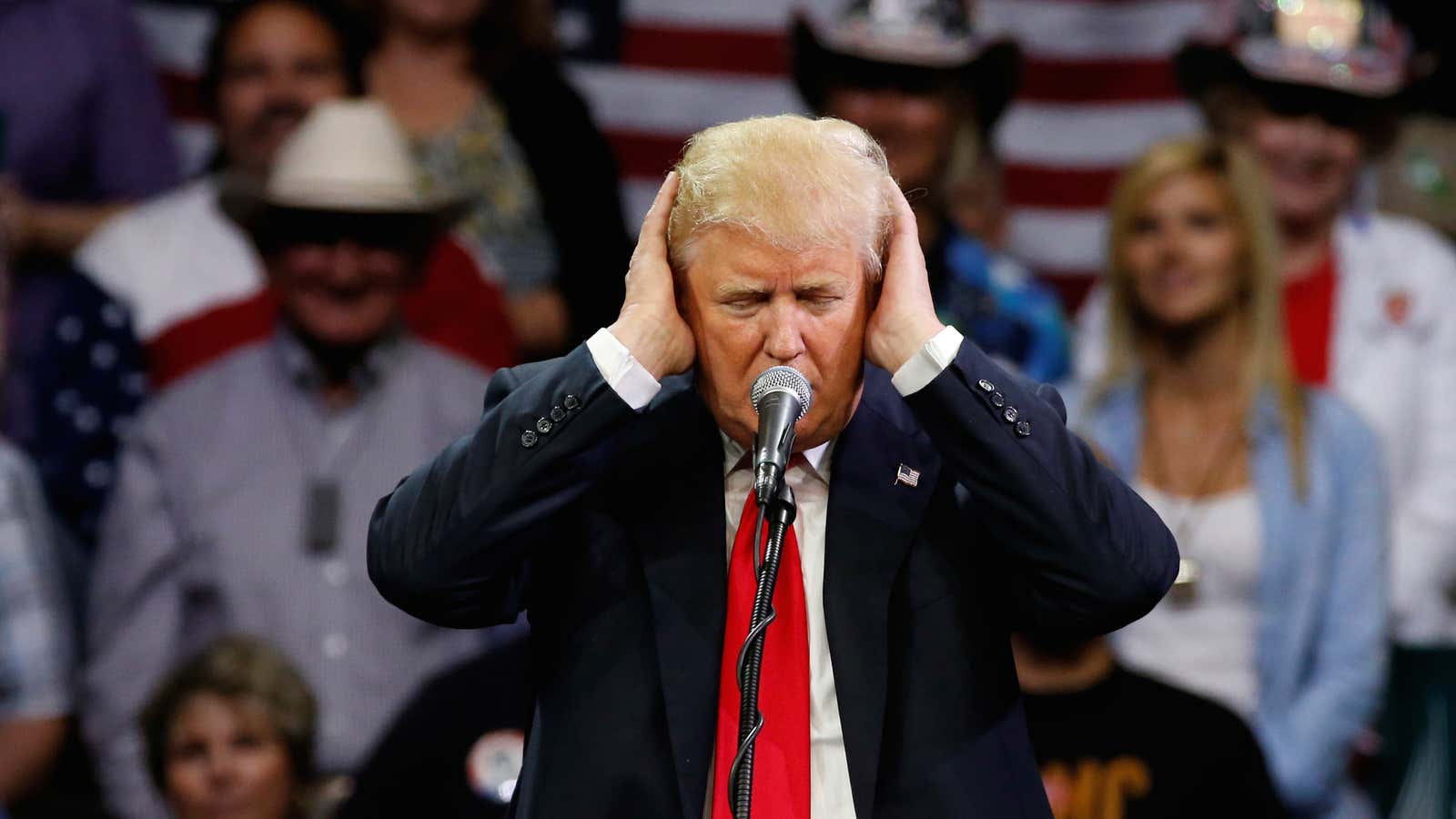Donald Trump’s campaign has lurched from scandal to scandal ever since he became the presumptive nominee in May. Just in the last week, he was roundly criticized for retweeting an anti-Semitic meme reportedly created by white supremacists, and giving a speech praising the repressive tactics of Saddam Hussein.
The press has been (rightfully) willing and eager to call out the Trump campaign for his mistakes. But there’s one topic that hasn’t resulted in the same kind of blanket national media attention and outrage: allegations that Trump has committed sexual violence.
This isn’t exactly surprising. Accusations of sexual harassment and assault can be difficult to prove. Moreover, many powerful people have an interest in downplaying them. In this case, the candidates running against Trump are as reluctant as he is to use the scandal as political fodder.
The oldest of the rape accusations against Trump dates back more than 20 years. Harry Hurt III’s Last Tycoon: The Many Lives of Donald J. Trump, published in 1993, describes a 1989 assault which at the time Trump’s ex-wife Ivana characterized as a “rape.” According to Hunt, Trump had gone to a doctor Ivana had recommended for scalp reduction surgery. When the treatment went poorly, Ivana said that Trump, in a rage, violently attacked her.
Trump denied the charges, and Ivana was quoted in a statement at the beginning of the book as well as in a footnote that she did not want “rape” to be “interpreted in a literal or criminal sense.” She did not change her description of the incident, however.
Trump was also accused of sexual assault by a woman in 1997; again, he denied the charges. The plaintiff in the case dropped her lawsuit shortly after filing, but said she stood by her accusations in a text message sent to the Guardian in February. And this summer, new rape allegations against Trump were filed. An anonymous woman claimed in a federal lawsuit that Trump raped her in 1994, when she was 13 years old. The lawsuit alleges that the accuser attended a number of parties arranged by Jeffrey Epstein, a billionaire convicted in 2008 of soliciting an underage prostitute. In her lawsuit, the woman says Trump tied her to a bed and “proceeded to forcibly rape” her, despite her pleas for him to stop. Trump and Epstein then allegedly threatened her and her family if she took the case to the authorities.
This accusation is certainly more inflammatory than a retweet. Yet coverage, both in mainstream and social media, has remained muted.
It’s hard to say why this is. In a presidential campaign, the media often takes its cues on what controversies to cover from the candidates themselves; what campaigns prioritize becomes central to the news cycle. In this case, partisan incentives could in theory put a spotlight on accusations of sexual violence. Trump’s misogyny is a central theme of Hillary Clinton’s campaign; the rape accusations against him could easily be the focus of an attack ad.
But there is little partisan incentive for Democrats to focus on rape allegations. That’s because Democratic presumptive nominee Hillary Clinton’s husband, former president Bill Clinton, has also been accused of rape and sexual harassment.
The oldest accusation against Clinton, and the most credible, was made by Juanita Broaddrick, a volunteer for Clinton’s campaign for Arkansas governor in 1978. Broaddrick says Clinton arranged a meeting about campaign matters in a hotel room in April of 1978; when Broaddrick arrived, Clinton made sexual advances and then, she says, raped her. A number of witnesses have said that they saw Broaddrick’s injuries after the incident. Clinton has denied the allegations.
Neither the accusations against Trump nor those against Clinton have been proven in a court of law. But public willingness to discuss the accusations has more to do with political affiliation than with the facts at hand. Right-wing websites and commenters have supported Broaddrick’s claims for years. Meanwhile, left-wing sites and pundits have focused on the accusations against Trump.
In 2014, Jessica Luther pointed out that when athletes are accused of rape, the media conversation is almost entirely about how the accusations will affect the athletes and the sports season. Similarly, the rape accusations against Trump and Clinton are mostly framed in partisan terms. How they could affect the election looms larger than how the women in question may have been harmed, or whether they deserve justice.
Throughout history, powerful men have had a vested interest in downplaying the dirty pasts of other powerful men. This is especially true in politics. This dynamic recalls the controversial Clarence Thomas sexual harassment scandal. During his 1991 Supreme Court confirmation hearing before the Senate Judiciary Committee, Thomas was accused by former staffer Anita Hill of systemic sexual harassment. Senator Ted Kennedy, a leading Democrat on the committee, was famously silent during the questioning. Kennedy had been involved in a notorious incident in 1969 in which he drove a car off a bridge, resulting in the drowning of Mary Jo Kopechne, whose death Kennedy did not report for ten hours.
At the time of the Thomas hearings, Kennedy’s nephew, William Kennedy Smith, was also facing rape accusations in Florida. Kennedy denied that the Smith trial affected his conduct at the Thomas hearings. But even if he tried to set it aside, Kennedy’s past and relations created an obvious conflict of interest.
Powerful people facing sexual harassment allegations have an incentive to identify with other powerful people who face sexual harassment allegations. Trump, who wants to be president, and Bill Clinton, who wants his wife to be president, have many disagreements. But their actions suggest they agree that accusations of sexual misconduct should not necessarily undermine the pursuit of high office. And that agreement means that fewer people will listen when victims speak.
